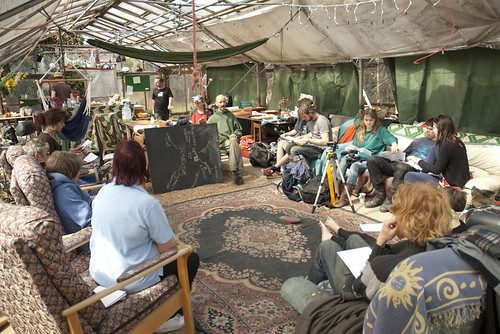We don't sit in trees any more
Calvino's novel was written in 1957 — a novel about rebellion in a not-particularly-rebellious era. But a generation later, in April 1970, college students and politicians organized a "nationwide environmental teach-in" held mostly on college campuses. It would later become known as the first "Earth Day."
Historian Jared Farmer recounts one of the first Earth Day protests in his book Trees in Paradise, which I learned about recently on the Huntington Library's blog. A synopsis there recounts how "At Moorpark College, in Ventura County, 50 students laid their bodies down in front of bulldozers to protest the widening of a tree-lined road... By the time 10 students were arraigned in juvenile court on April 22, the first Earth Day, the trees were gone."
“What had been lost? Ancient redwoods? Historic oaks? No. They aren’t even native plants. Most of the trees in question are Australian eucalypts planted in the 19th century as ornamentals.”With the benefit of 44 years' worth of hindsight, most Golden State environmentalists of 2014 would probably not risk arrest over some Australian eucalyptus trees. Today, they're generally considered an invasive species that sucks away scarce groundwater and fuels dangerous wildfires with their oily foliage and shedding bark.
But trees — especially giant Californian trees — remained a powerful synecdoche for environmentalism. Tree protests reached a peak in the late 1990s when the charismatic Julia Butterfly Hill, with support from Humboldt County Earth First! activists, spent two years sitting in a 600 year-old redwood that she named Luna.
The immediate consequence of Hill's endurance tree-sit was the permanent protection of her tree and a 200 foot buffer zone from a logging operations.
But more generally, Hill's activism attracted national attention to the regional battles between loggers and environmentalists over the fate of the Pacific coast's old-growth forests. Thanks to stronger enforcement of the Endangered Species Act, West Coast logging was already in steep decline by the late 1990s. The activism of treesitting brought the additional accountability of publicity to logging operations.
In the years since Hill climbed down from Luna, living in trees in order to save trees has become rarer and rarer — in part because it has become less necessary. In the interest of avoiding controversy, logging businesses have committed to more sustainable forms of forestry, and conservation organizations have been able to protect most of what remains of the west's old growth trees. More ambiguously, more timber harvesting has moved overseas, away from the critical eyes of Californian idealists.
Today, treesitting feels like a bit of a 1990s anachronism. We're taught, as ecologists, to think about the complexity of global ecosystems. The idea of devoting months' or years' worth of activism to save a small grove of trees can seem like a lark in the context of the world's more pressing, global crises.
But under the apocalyptic threats of losing everything, any form of activism will feel inadequate. Before we throw up our hands, it's worth noting that Julia Butterfly Hill and her tree-sitting colleagues actually accomplished most of their goals, and leveraged influence far beyond their ambitions. It's the Butterfly effect: given enough time, repeated small actions will eventually generate big changes.



















